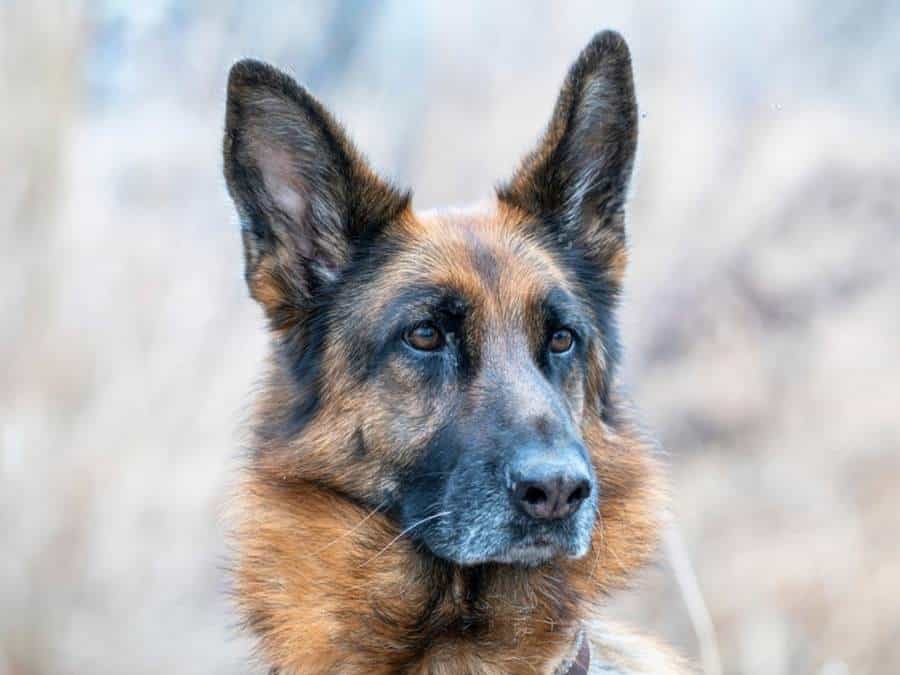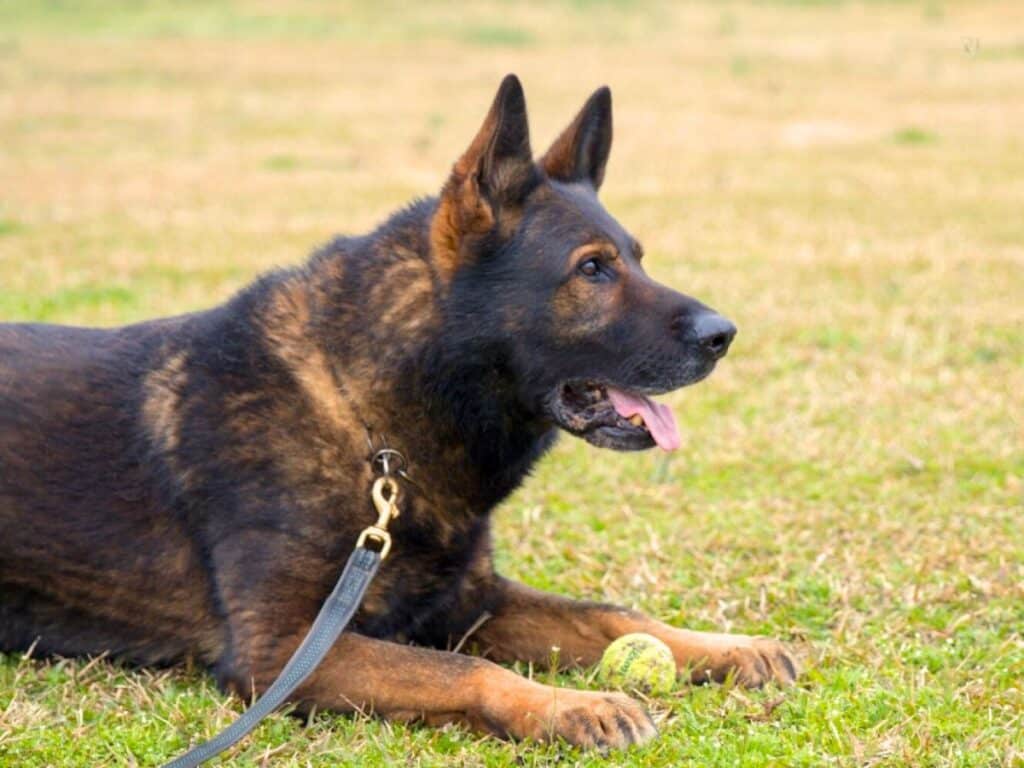Are you considering adopting a senior German Shepherd? Adopting an older dog can be incredibly rewarding as you’re not only welcoming a lifetime of love into your home—you’re also saving a precious life!
Many shelters have older German Shepherds in their care, but a common desire to adopt young pups often leaves the seniors overlooked.
Puppies are usually the more commonly sought-after pets, but for many potential pet parents, older German Shepherds may be a better fit.
As with any new pet, there are both challenges and benefits to adopting a senior German Shepherd.
Is it a good idea to adopt a senior German Shepherd? Find out the pros and cons of adding a senior GSD to your family.
Benefits of Adopting a Senior German Shepherd
Adopting a senior dog can be a rewarding experience with several benefits:
Calmer demeanor & lower energy
Senior dogs are often more relaxed and have outgrown the hyperactive puppy stage. This can make them a great choice for households seeking a more calm and laid-back pet.

You know more about their personality
Unlike puppies, senior dogs have a developed personality, and their behavior is more predictable. This can help you choose a dog that matches your lifestyle and preferences.
They need less training
Many senior dogs are already house-trained and may have basic obedience skills. This can make the transition into your home smoother and require less intensive training.
They are happy and thankful for being cared for
Senior dogs often show a deep sense of gratitude for being adopted. Building a bond with an older dog can be a fulfilling experience as they appreciate the love and care you provide in their golden years.
Their health condition is known
While senior dogs may have some health issues, their medical needs are usually known. This allows you to be aware of any conditions and provide appropriate care. Regular veterinary check-ups can help manage their health effectively.
Senior dogs are less destructive
Senior dogs are generally past the destructive chewing phase and are less likely to engage in destructive behaviors that are common in younger dogs.
You’ll be saving a life
When you adopt an older dog, you also have the opportunity to make a significant impact on their life. By providing love and care to an aging canine companion, you offer them comfort and security in their later stages of life.
Moreover, adopting senior dogs often means saving them from spending their final days in shelters or being euthanized due to overcrowding.
Check out this step-by-step Guide on Rescuing A German Shepherd to understand the adoption process and seamlessly integrate your rescued GSD into your family.

Challenges of Adopting a Senior German Shepherd
There are plenty of reasons to adopt an older German Shepherd. But common challenges can arise with older animals, too. Before you decide to bring a senior pet into your life, make sure you’re aware of the issues that sometimes come with older GSDs.
Pre-existing health issues
Senior dogs may have pre-existing health conditions or develop age-related ailments. This can result in increased veterinary care and potential medical expenses. It’s important to be prepared for the possibility of managing chronic health issues.
RELATED: What Is The Best Age To Adopt A German Shepherd?
A longer adjustment period
Older dogs may take some time to adjust to a new environment, routine, and family. Be patient and understanding during this transition phase as they get accustomed to their new surroundings.
Old behavioral habits
Older dogs may have established behavioral habits, both positive and negative. It can take time and consistent training to modify any undesirable behaviors or reinforce positive ones.
They may still have attachment to their previous owners
Senior German Shepherds may have formed strong attachments to their previous owners, making it an emotional adjustment for them to bond with new caregivers. Building trust and forming a new bond may require time and patience. (Source)
You’ll have a limited time together
Adopting a senior German Shepherd means you may have fewer years together compared to adopting a younger dog. It’s important to consider the emotional aspects of forming a connection with a dog that may have a shorter lifespan.
They may be grieving
If the senior dog has experienced the loss of a previous owner or a companion animal, they may go through a grieving process. Understanding and supporting them during this time is crucial.
They may not be trained & socialized properly
While some senior dogs may be well-trained, others may have limited training or socialization experiences. Assessing their training history and addressing any gaps may be necessary.
You may need to spend a bit more when caring for an older dog
Older dogs may require more frequent veterinary visits and medical care. It’s important to be financially prepared for potential health-related expenses that may arise as your senior dog ages.
Despite these challenges, many people find immense joy and fulfillment in adopting older dogs. Understanding and addressing these challenges with patience, love, and proper care can lead to a happy and rewarding relationship with your senior canine companion.
RELATED:
- How To Adopt A German Shepherd?
- How Much Does It Cost To Adopt A German Shepherd?
- Where Can I Adopt A German Shepherd Puppy?

Tips For Adopting A Senior German Shepherd
Adopting a senior German Shepherd requires some unique considerations. Here are some tips to ensure a smooth and positive experience:
Visit shelters and rescues
Explore local shelters and rescue organizations to find senior dogs available for adoption. Spend time interacting with different dogs to gauge their personalities and compatibility with your lifestyle.
Understand their background
Try to gather information about the senior dog’s background, including any health issues, behavioral habits, and previous living conditions. This can help you make an informed decision and prepare for their specific needs.
Get a thorough veterinary check-up done
Schedule a thorough veterinary check-up for the senior dog soon after adoption. This can help identify any existing health issues and establish a baseline for their overall well-being.
Establish a consistent routine
Older dogs often appreciate a consistent routine. Establish regular feeding times, walks, and play sessions. A predictable routine can help them feel secure in their new environment.
Gradually introduce new food
Feed the senior dog small amounts for the first day or two, using any food that came with him, gradually mixing in whatever you choose to feed. If he doesn’t eat much right away or even vomits from nerves, don’t panic. Feed him well away from the others and don’t offer treats for a couple of days.
Create a comfortable space at home
Set up a comfortable and safe space for your new senior dog, complete with a cozy bed, water bowl, and toys. Providing a quiet and secure area can help them feel at ease as they adjust to their new home.
RELATED: How to Prepare Your Home For a New German Shepherd
Be patient and understanding
Understand that dogs, like people, have developed habits, routines, and “this is what I’m used to” stuff over the years that may linger for a while in a new home. Resolve to be patient with the dog as he adjusts to his new life.

Caution the kids
If you have young children and they’re not used to having an older dog around make sure you talk to them about how they need to be gentle with your senior German Shepherd and generally be respectful of him because he’s older.
Monitor their health regularly
Keep a close eye on your senior dog’s health. Regular veterinary check-ups, proper nutrition, and any necessary medications are essential to maintaining their well-being.
Adapt your home according to their needs
Make necessary adjustments to your home to accommodate the specific needs of a senior dog. This may include providing ramps for easy access, non-slip surfaces, and comfortable bedding.
Provide them with a senior-dog-specific diet
According to the American Veterinary Medical Association, you should consult with your veterinarian to determine an appropriate senior-specific diet for your dog. Older dogs may have different nutritional requirements, and a tailored diet can support their health.
Provide gentle age-appropriate exercise
While older dogs may not require intense exercise, regular, gentle walks, and moderate activity can help maintain their mobility and overall health. Adapt the exercise routine based on their abilities.
Create a loving environment for them
Shower your senior dog with love, attention, and affection. Building a strong bond and creating a loving environment is crucial for their emotional well-being.
Adopting a senior dog can be a truly rewarding experience, and with thoughtful care and attention, you can provide a loving home for a dog in their golden years.
Final Remarks
Now, go ahead and explore local shelters or rescue organizations to find and adopt your perfect senior German Shepherd. Your decision to adopt a senior dog not only transforms their life but also enriches yours in ways you can’t even imagine. Get ready for tail wags, cozy cuddles, and unforgettable moments with your new furry friend!
Frequently Asked Questions
Is adopting a senior dog more challenging than adopting a younger dog?
Adopting a senior dog comes with its own unique set of considerations, but it’s not necessarily more challenging. Older dogs often have established temperaments and are typically less demanding in terms of training and exercise.
How can I prepare my home for welcoming a senior German Shepherd?
Making your home safe and comfortable for an older canine companion involves simple adjustments like providing easy access to food and water, ensuring non-slip surfaces, and creating cozy resting spots. It’s also important to consider any specific needs based on the individual dog’s health.
What health considerations should I keep in mind when adopting an older dog?
When considering adopting an older dog, it’s crucial to be aware of potential age-related health issues such as arthritis or dental problems. Regular veterinary check-ups become even more essential for monitoring and addressing these concerns proactively.
How can I adjust to the lifestyle and energy levels of a senior dog?
Understanding that older dogs may have lower energy levels helps manage expectations. Engaging in gentle activities like short walks or mental stimulation games tailored to their abilities can provide fulfilling interactions while respecting their limitations.
FURTHER READING:




